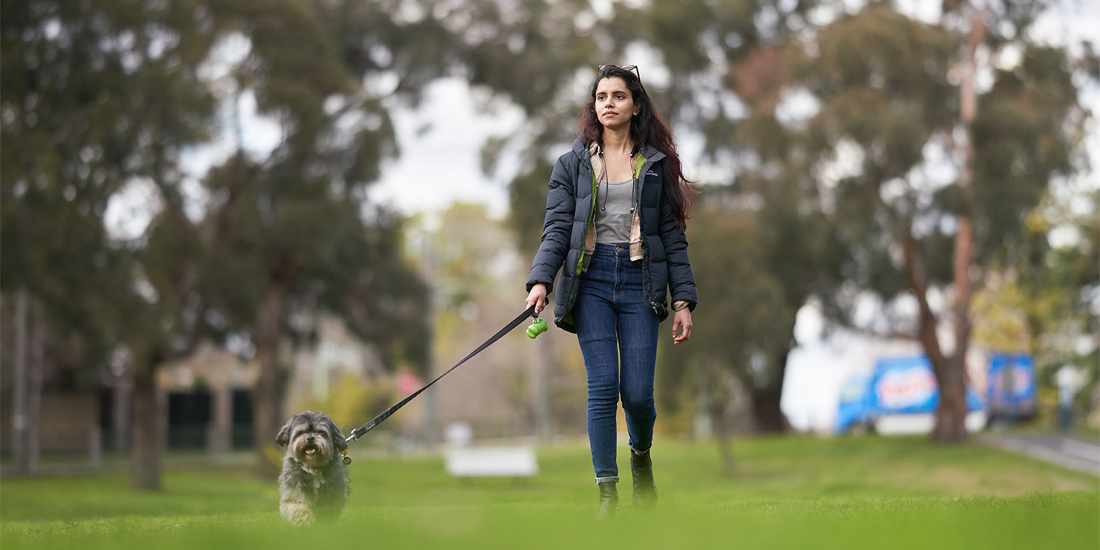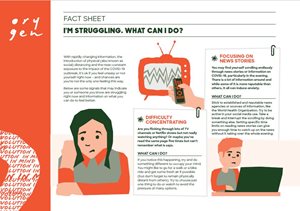I'm struggling. What can I do?
 With rapidly changing information, the introduction of physical (also known as social) distancing and the near-constant exposure to the impact of the COVID-19 outbreak, it’s ok if you feel uneasy or not yourself right now – and chances are you’re not the only one feeling this way.
With rapidly changing information, the introduction of physical (also known as social) distancing and the near-constant exposure to the impact of the COVID-19 outbreak, it’s ok if you feel uneasy or not yourself right now – and chances are you’re not the only one feeling this way.
Below are some signals that may indicate you or someone you know are struggling right now and information on what you can do to feel better.
Difficulty concentrating
Are you flicking through lots of TV channels or Netflix shows but not really watching anything? Or maybe you’ve read the same page five times but can’t remember what is says.
What can I do?
If you notice this happening, try and do something different to occupy your mind. You might like to go for a walk or a bike ride and get some fresh air if possible (but don’t forget to remain physically distant from others). Try to choose just one thing to do or watch to avoid the pressure of many options.
Focusing on news stories
You may find yourself scrolling endlessly through news stories or information on COVID-19, particularly in the evening. There is a lot of information around and while some of it is more reputable than others, it all can induce anxiety.
What can I do?
Stick to established and reputable news agencies or sources of information, like the World Health Organization. Try to be active in your social media use. Take a break and interrupt the scrolling by doing something else. Setting specific time limits on reading news stories can give you enough time to catch up on the news without it taking over the whole evening.
Difficulty sleeping or sleeping too much
You may notice that you are sleeping too much or you are not able to sleep well.
What can I do?
Try and keep to your normal routine; it may sound strange to keep this routine when everything else in your routine may have been disrupted, but it will help your sleep pattern. Avoid looking at your phone or other screens, such as TV or a computer, for an hour before you go to bed. Try not to sleep in the day and set your alarm to get up at the normal time for you. If you are feeling more tired than usual, remember that the COVID-19 outbreak is creating an extra mental and emotional load. Be gentle with yourself.
Changes in diet
You may notice that you aren’t hungry or that you are eating more than usual.
What can I do?
Try to keep to your normal routine, it is ok to treat yourself but try and stick to three healthy meals per day. Visit the Head to Health website for some tips and inspiration.
Changes in body shape
You might notice that changes in your routine creates changes in your body image or shape. It could be that you are exercising more or less than you usually would, or you are eating more or less than usual. Changes in body shape or image can create feelings of anxiety.
What can I do?
It’s ok. If you are concerned about your own or someone else’s disordered eating, speak to your GP. You can also learn more about body image and eating disorders on the Orygen and Centre of Excellence in Eating Disorders websites for more information.
Increased use of alcohol, tobacco or other drugs
If you’re feeling anxious, stressed, depressed or bored, you may notice an increase in your drug or alcohol use.
What can I do?
Try and keep track of your use by using an app or diary. It’s important to also keep track of how you are feeling when you are using substances. Sticking to your normal routine (e.g. not drinking/using during work or study hours or at times you usually wouldn’t) and keeping yourself busy at home can help limit your use. Some people find putting a time limit around using can help, such as, if you usually drink at 5pm, try and put it off until 6pm. This can help in two ways, firstly by reducing your use. Secondly, if you try and do something else for a while, the need to use may reduce a little. Reach out for help and information if you think substance use is becoming problematic.
Increased anxiety, distress or anger
You may feel that you are more anxious, distressed or angry than usual. You may also notice that these feelings are part of a cycle, or that you are more up and down than usual. This is completely normal. Remember, lots of people will be feeling like this at the moment.
What can I do?
Anxiety is a feeling like all others; don’t try and push it away, it will fade in time.
Avoiding the thing you are feeling anxious about can make anxiety worse. However, this is an unusual situation and news and information about COVID-19 can be difficult to escape. Try to notice if you feel your anxiety increasing when reading the news. If so, try to avoid news stories for a while and find something else that helps you feel good.
Be gentle with yourself, the world is adjusting to a new ‘normal’ and it is understandable that people are feeling things more intensely or differently than usual. Make space for these feelings and talk them through with others.
There are resources available online if you would like to learn more about anxiety and its effects on mental health.
Losing interest in the things you normally love
You may notice that you are not as interested in the things you normally love. For example, if you love playing footy or soccer, you may avoid watching old games as it feels too hard.
What can I do?
This is completely normal. Give yourself a break, but try and stay connected with people you share these interests with, such as teammates. Remind yourselves what you love about your interest and why you became involved.
Social isolation and social media
You may notice that you aren’t using social media in the same way you do usually. You may feel like you can’t be bothered face timing friends or that there is no point in posting on your social media as there is nothing happening in your life.
What can I do?
It is normal and ok if the way you use social media changes. Explain to your friends how you feel and try to stay connected with just one or two close friends.
 Download these tips
Download these tips